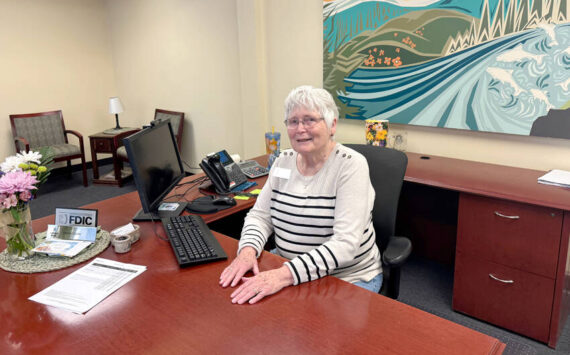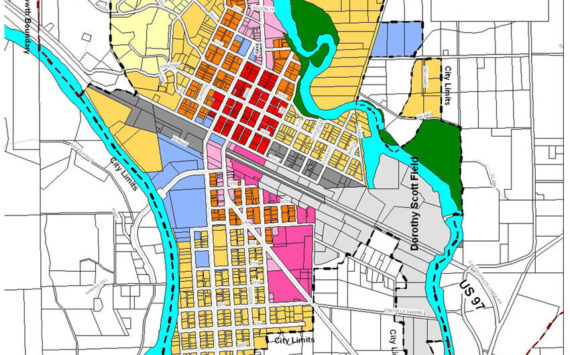Committee to formalize, continue health care services discussion
OKANOGAN – Okanogan County Commissioners are not angling to consolidate the county’s three hospitals, they assured a North County-heavy audience at a session called by Commissioner Sheilah Kennedy on Wednesday, April 30.
The two hour meeting covered a wide range of county-related health care topics, most of which trickle down from changing state and federal mandates. But what drew about two-thirds of the audience – including a healthy contingent of administrative staff from North Valley Hospital – were reports last month that there was enough momentum building toward a consolidation of the three county hospitals that plans had actually been drawn up for a new facility in Omak.
Though many were in attendance to hear about such possible consolidation efforts, that topic wasn’t discussed at length until Tonasket Mayor Patrick Plumb (also an NVH employee) more or less forced the issue to the forefront.
Plumb said he was concerned about the potential impact of Tonasket losing 240 jobs if the hospital were to close as part of a consolidation effort.
“I hear at least two of you today saying that’s not the direction you want to go,” Plumb said. “I appreciate Mr. Campbell talking about (the impact of a hospital closure in Deer Park, referenced briefly earlier in the meeting) and that is exactly what we don’t want to see in Tonasket.
“I’m just making sure there isn’t a different path we’re trying to take here. If you consolidate all these hospitals …we’d lose the Critical Access program entirely. Consolidating services is always a great idea until you lose your funding structure.”
“To make it clear, we as Okanogan County Commissioners have no say in our public hospitals,” Kennedy said. “It’s the elected officials … The fact is all three hospitals are on registered warrants. That is an impact to the county. The community (is) asking how come we don’t combine the hospitals. That is a question this committee might finally be able to address one way or the other: (either) yes it makes sense, no it doesn’t make sense, and here are the reasons why….
“Bottom line is, we’re going to define through all of our work what the people want, and what we’re going to keep, and what we’re going to provide.”
“Are we planning on keeping all three of these hospitals viable?” Plumb asked.
“I think we’ve stated that several times during this meeting,” Commissioner Jim DeTro said.
“Maybe we can set that to rest, that we’re saying we’re going to consolidate into a 100 bed hospital in North Omak and build it on Tollefsen’s ground there,” Plumb said, referring to media reports, extensively quoting outgoing Three Rivers Hospital (Brewster) CEO Bud Hufnagel regarding a potential new facility.
“That has to come from this group out here, not us,” said Commissioner Ray Campbell. “The rumor mill and your concerns are clear off base.”
The consensus was that the committee should continue to meet on a monthly basis, but that it needs to put a structure, bylaws and goals put into place.
“We need to figure out and understand what’s coming our way,” Kennedy said at one point. “All the moving areas we don’t even yet know of because of the Affordable Care Act.
“With three hospitals on registered warrants, how do we save what we have, how do we as Okanogan County and the citizens of the county define what it is we want to have in this county, before Olympia, before our region, before our national levels decide for us?”
The alternative, DeTro said, is to sit back and wait to see what happens, with little control over the outcome.
“We’d be at the mercy of federal and state mandates,” he said.
Short addresses other concerns
State Rep. Shelly Short (R-Addy), who serves on the Washington State House Committee on Health Care and Wellness, discussed a number of topics.
Perhaps one of the most alarming possibilities to the rank-and-file consumer is proposed regulation of the Affordable Care Act insurance exchanges that would severely limit coverage to rural areas.
Mid Valley Hospital CEO Mike Billing explained that State Insurance Commissioner Mike Kreidler proposed that insurance companies working through the market exchange provide a certain amount of coverage for services within a 30 mile limit of their headquarters, then a lesser set of coverage options for people 30-60 miles from there.
“Somehow there is a belief that a person who may not be of much wealth living in a rural area isn’t going to have the same kind of access to health care as those who are going to live within 30 miles of the headquarters,” Billing said.
Short said she was vocal in her opposition to the proposal with Kreidler, as it would basically boot rural residents “out of network” with their insurance.
“The 30/60 mile rule gives them the ability to say, instead of providing that network service in Omak, it will be in Wenatchee,” Short said. “When you aren’t considered ‘in network,’ two things happen: your institutions go away, or the people who rely on your services have to pay more… (Kreidler) thought it was OK for people to go to Spokane. I reminded him of where people live, where it can be a three hour trip even in good weather.”
She said it’s the sort of thing that may continue to happen as Affordable Care Act regulations continue to take effect.
“It’s not so much a state legislative rule, as it is the insurance companies saying (because) we’ve received the ACA mandates, so where do we trim costs? One way to do that is to narrow the networks.”
Short added that she has opposed House Bill 2572, proposed by Gov. Jay Inslee, for a number of reasons.
“It’s an added layer,” she said, explaining that the bill includes a number of shared funding mechanisms she found problematic. “If you are part of this shared funding accountability and outcomes, who decides what (money) goes where? The pot of money isn’t increasing. You bring everyone together and then try to decide who gets money for services and who doesn’t … I don’t think that’s what they meant to do but there is a real danger there.”
The wide-ranging discussion also focused the state of mental health and chemical dependency care in the county and state, and concern expressed by Tonasket VA Clinic advocates Dale White and Michael Stewart about how some of the possible changes could affect the veterans under the Tonasket clinic’s care.
The meeting included a conference call with Washington State Counties Association Policy and Legislative Relations staff Brad Banks and Abby Murphy, who also answered a number of questions from the local participants.




